商务英语谈判教案(S)
外语商务谈判课程设计
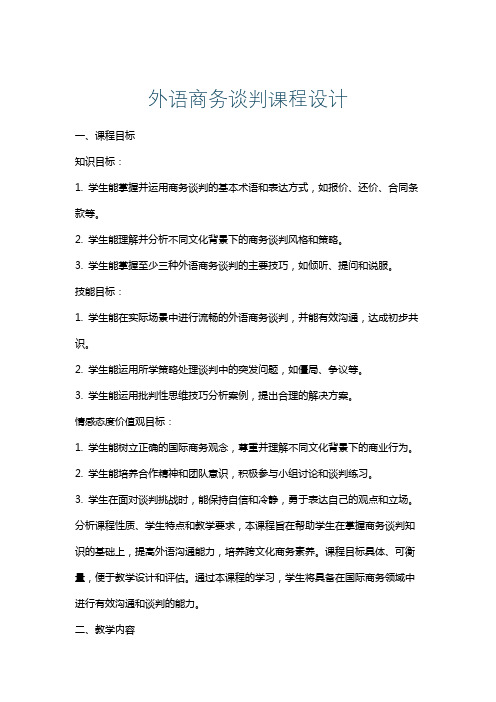
外语商务谈判课程设计一、课程目标知识目标:1. 学生能掌握并运用商务谈判的基本术语和表达方式,如报价、还价、合同条款等。
2. 学生能理解并分析不同文化背景下的商务谈判风格和策略。
3. 学生能掌握至少三种外语商务谈判的主要技巧,如倾听、提问和说服。
技能目标:1. 学生能在实际场景中进行流畅的外语商务谈判,并能有效沟通,达成初步共识。
2. 学生能运用所学策略处理谈判中的突发问题,如僵局、争议等。
3. 学生能运用批判性思维技巧分析案例,提出合理的解决方案。
情感态度价值观目标:1. 学生能树立正确的国际商务观念,尊重并理解不同文化背景下的商业行为。
2. 学生能培养合作精神和团队意识,积极参与小组讨论和谈判练习。
3. 学生在面对谈判挑战时,能保持自信和冷静,勇于表达自己的观点和立场。
分析课程性质、学生特点和教学要求,本课程旨在帮助学生在掌握商务谈判知识的基础上,提高外语沟通能力,培养跨文化商务素养。
课程目标具体、可衡量,便于教学设计和评估。
通过本课程的学习,学生将具备在国际商务领域中进行有效沟通和谈判的能力。
二、教学内容本课程教学内容分为五个单元,每个单元均围绕课程目标进行科学性和系统性的组织。
单元一:商务谈判基本概念内容:商务谈判的定义、原则、类型;谈判的基本过程和策略。
教材章节:第一章《商务谈判概述》单元二:跨文化商务沟通内容:文化差异对商务谈判的影响;不同文化背景下的谈判风格和技巧。
教材章节:第二章《跨文化商务沟通》单元三:外语商务谈判技巧内容:外语商务谈判的基本技巧,如倾听、提问、说服等;谈判中的语言运用和非语言沟通。
教材章节:第三章《外语商务谈判技巧》单元四:商务谈判实务内容:报价、还价、合同条款等实务操作;谈判中可能出现的问题及应对策略。
教材章节:第四章《商务谈判实务》单元五:商务谈判案例分析内容:分析具有代表性的商务谈判案例,总结成功谈判的经验和教训。
教材章节:第五章《商务谈判案例分析》教学内容安排和进度根据课程目标和学生的实际情况进行制定,确保学生在掌握理论知识的基础上,进行实践操作和案例分析,提高外语商务谈判能力。
商务英语商务谈判教案

商务英语商务谈判教案I. 引言商务谈判是商务交流中至关重要的一环。
对于想要在国际商务领域取得成功的人来说,掌握商务谈判技巧是必不可少的。
本教案将介绍商务英语商务谈判的基本知识和技巧。
II. 商务谈判的重要性商务谈判是商务人士与国际合作伙伴之间沟通和达成共识的关键过程。
它有助于解决问题、建立信任关系和促进商业合作。
同时,商务谈判也是展示专业知识和技能的机会。
III. 商务谈判的准备工作在进行商务谈判前,必须进行充分的准备。
以下是准备工作的步骤:1. 研究对方企业:了解对方企业的背景信息、核心价值观以及市场地位,有助于理解他们的需求和利益。
2. 设置目标:明确自己的谈判目标,并确保它们符合自身利益和可行性要求。
3. 制定计划:制定详细的谈判计划,包括议程、时间安排和流程。
4. 掌握必要的信息:收集相关的市场数据、法律法规和贸易政策,以便在谈判中提供支持和解释。
5. 分析对方需求和利益:了解对方企业的需求和利益,寻找双方共同的利益点,以获得更好的谈判结果。
IV. 商务谈判的基本技巧商务谈判需要掌握一定的技巧,下面是一些基本的技巧:1. 积极倾听:倾听对方意见,表现出尊重和理解,以建立积极的谈判氛围。
2. 清晰表达:用简洁明了的语言表达自己的意见和观点,避免产生歧义和误解。
3. 提出解决方案:在谈判中不仅要指出问题,还要积极提出解决方案,以便给谈判达成共识提供框架。
4. 灵活应变:根据谈判的进展情况,及时调整自己的策略和立场,以满足变化的需求。
V. 谈判中的文化差异在商务谈判中,不同国家和地区之间存在着文化差异。
了解和尊重对方的文化差异是取得谈判成功的重要因素。
1. 礼貌与尊重:在亚洲国家谈判时,对方可能更看重礼貌和尊重,所以在交流中要特别注意这一点。
2. 时间观念:一些国家对时间观念有不同的看法,可能更加弹性和宽松,因此,灵活调整时间安排是必要的。
3. 谈判风格:不同国家的谈判风格也存在差异,有些国家更偏好直接坦诚的方式,而其他国家则更注重间接和委婉的表达。
商务英语谈判 教案
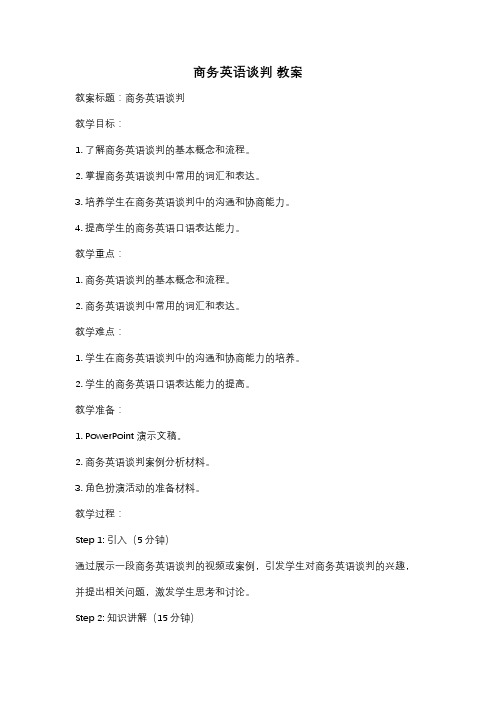
商务英语谈判教案教案标题:商务英语谈判教学目标:1. 了解商务英语谈判的基本概念和流程。
2. 掌握商务英语谈判中常用的词汇和表达。
3. 培养学生在商务英语谈判中的沟通和协商能力。
4. 提高学生的商务英语口语表达能力。
教学重点:1. 商务英语谈判的基本概念和流程。
2. 商务英语谈判中常用的词汇和表达。
教学难点:1. 学生在商务英语谈判中的沟通和协商能力的培养。
2. 学生的商务英语口语表达能力的提高。
教学准备:1. PowerPoint演示文稿。
2. 商务英语谈判案例分析材料。
3. 角色扮演活动的准备材料。
教学过程:Step 1: 引入(5分钟)通过展示一段商务英语谈判的视频或案例,引发学生对商务英语谈判的兴趣,并提出相关问题,激发学生思考和讨论。
Step 2: 知识讲解(15分钟)讲解商务英语谈判的基本概念和流程,包括准备阶段、开场白、信息交流、协商和达成协议等环节。
同时,介绍商务英语谈判中常用的词汇和表达,如提议、反驳、妥协等。
Step 3: 案例分析(20分钟)分发商务英语谈判案例分析材料,让学生阅读并分析其中的情境和问题。
然后,组织学生进行小组讨论,让他们根据案例中的情境,提出解决问题的方案,并进行角色扮演。
Step 4: 角色扮演(20分钟)根据上一步的讨论结果,组织学生进行角色扮演活动。
让学生分成小组,每个小组扮演不同的角色,进行商务英语谈判的模拟演练。
教师可以扮演客户或其他相关角色,引导学生进行谈判并提供实时反馈和指导。
Step 5: 反思总结(10分钟)让学生回顾整个谈判过程,总结经验和教训。
同时,引导学生思考如何改进自己的商务英语谈判能力,并提供相关建议和指导。
Step 6: 作业布置(5分钟)布置相关的作业,如写一篇关于商务英语谈判的总结或准备下一堂课的预习等。
教学辅助手段:1. PowerPoint演示文稿:用于讲解商务英语谈判的基本概念和流程,以及常用的词汇和表达。
2. 商务英语谈判案例分析材料:用于学生分析和讨论。
商务英语国际商务谈判教案
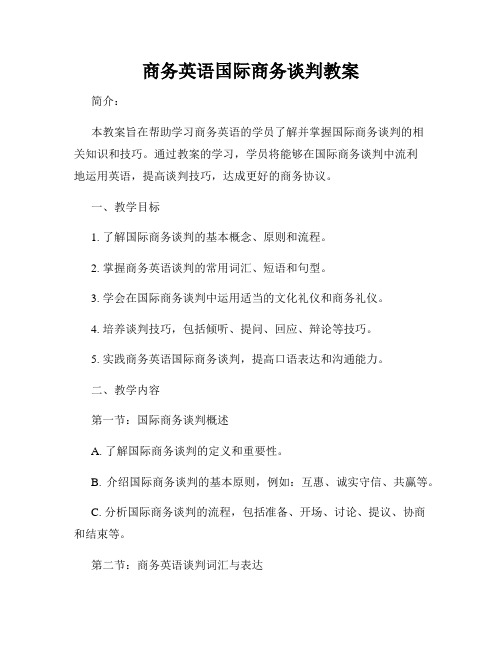
商务英语国际商务谈判教案简介:本教案旨在帮助学习商务英语的学员了解并掌握国际商务谈判的相关知识和技巧。
通过教案的学习,学员将能够在国际商务谈判中流利地运用英语,提高谈判技巧,达成更好的商务协议。
一、教学目标1. 了解国际商务谈判的基本概念、原则和流程。
2. 掌握商务英语谈判的常用词汇、短语和句型。
3. 学会在国际商务谈判中运用适当的文化礼仪和商务礼仪。
4. 培养谈判技巧,包括倾听、提问、回应、辩论等技巧。
5. 实践商务英语国际商务谈判,提高口语表达和沟通能力。
二、教学内容第一节:国际商务谈判概述A. 了解国际商务谈判的定义和重要性。
B. 介绍国际商务谈判的基本原则,例如:互惠、诚实守信、共赢等。
C. 分析国际商务谈判的流程,包括准备、开场、讨论、提议、协商和结束等。
第二节:商务英语谈判词汇与表达A. 学习常用的商务英语谈判词汇和短语,例如:offer, counteroffer, negotiation, compromise, agreement等。
B. 掌握商务英语谈判句型,例如:I propose...; We suggest...; Our position is...等。
C. 练习商务英语谈判对话,模拟真实的商务谈判场景。
第三节:文化礼仪和商务礼仪A. 了解不同国家和地区的文化差异对商务谈判的影响。
B. 学习在国际商务谈判中适应文化差异的礼仪和注意事项。
C. 分析跨文化沟通的误解和解决方法,培养跨文化谈判的敏感性和灵活性。
第四节:谈判技巧与策略A. 掌握谈判中的基本技巧,例如:倾听、提问、回应、辩论等。
B. 学习谈判策略和战术,例如:时间压力、信息收集、权力平衡等。
C. 分析谈判中的利益分析和权力分析,了解各方的需求和立场。
第五节:实践与案例分析A. 进行商务英语国际商务谈判的实践演练,学员分组进行角色扮演。
B. 分析实际商务谈判案例,并讨论谈判结果和相关的经验教训。
三、教学方法1. 配合教材讲解,介绍相关理论知识和实际案例。
商务英语谈判 课程设计

商务英语谈判课程设计Business English Negotiation Course Design。
Introduction。
The Business English Negotiation course is designed to provide students with the necessary language skills and practical knowledge to effectively negotiate in a business setting. This course aims to enhance students' abilities to communicate, persuade, and reach mutually beneficial agreements in various business contexts. Through a combination of theoretical study, case analysis, and role-playing exercises, students will develop the essential skills and strategies required for successful negotiations in the global business environment.Course Objectives。
1. To develop students' understanding of key concepts and principles in business negotiation, including negotiation strategies, tactics, and styles.2. To enhance students' language proficiency in expressing and defending their interests, making proposals, and handling objections during negotiations.3. To cultivate students' critical thinking and analytical skills in evaluating negotiation situations and developing effective negotiation plans.4. To provide students with opportunities to apply their knowledge and skills in simulated negotiation scenarios and receive constructive feedback for improvement.Course Content。
国际商务谈判英文版课程设计

国际商务谈判英文版课程设计1. IntroductionThe International Business Negotiations course is designed for students who are interested in developing their negotiation skills inthe context of international business. This course ms to providestudents with a solid understanding of the principles of international business negotiation and to equip them with the necessary tools to conduct effective negotiations in today’s global marketplace.2. Course Objectives1.To provide students with an understanding of the keyconcepts and theories related to international businessnegotiation.2.To develop students’ critical thinking skills in relationto international business negotiation.3.To equip students with the practical skills needed toconduct successful negotiations, such as communication skills,problem-solving skills, and the ability to build relationshipswith business partners.4.To provide students with the opportunity to practice theirnegotiation skills through role-playing exercises and case studies.5.To develop students’ ability to work effectively in amulticultural and global environment.3. Course ContentWeek 1: Introduction to International Business Negotiation•Definition of international business negotiation•Cultural differences in negotiation•Types of negotiation and negotiation strategies Week 2: Preparation for International Business Negotiation•Identifying negotiation goals and objectives•Assessing the negotiation environment and the parties involved•Developing negotiation strategiesWeek 3: The Negotiation Process•Opening the negotiation•Bargning and making concessions•Closing the negotiationWeek 4: Communication Skills for International Business Negotiation •Active listening and questioning techniques•Persuasion and influence strategies•Nonverbal communication in negotiationWeek 5: Building and Mntning Relationships in International Business Negotiation•Importance of relationship-building in negotiation•Strategies for building trust and rapport with business partners•Mntning relationships after the negotiationWeek 6: Cross-cultural Negotiation•Cultural differences in negotiation styles and behaviors•Cultural dimensions and their impact on negotiation•Overcoming cultural barriers in negotiationWeek 7: Case Studies in International Business Negotiation •Analyzing case studies of international business negotiation •Identifying lessons learned and best practices•Applying negotiation concepts and strategies to real-world situationsWeek 8: Role-Playing Exercises in International Business Negotiation •Simulating negotiation scenarios in a classroom setting•Applying negotiation concepts and strategies to role-playing exercises•Receiving feedback on negotiation skills and areas for improvement4. Assessment1.Participation in class discussions and exercises (20%)2.Group project and presentation on a negotiation case study(30%)3.Individual reflective essay on negotiation skillsdevelopment (20%)4.Final examination (30%)5. ConclusionBy the end of the International Business Negotiations course, students will have gned a comprehensive understanding of the principles and practice of negotiation in the context of international business. They will have developed their negotiation skills through practical exercises and case studies, and will be equipped with the knowledge and tools to conduct successful negotiations in today’s global marketplace.。
《商务英语谈判》教案
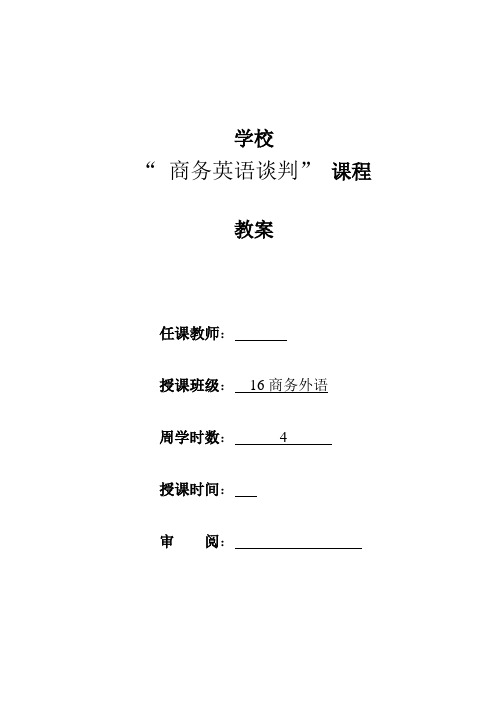
学校“商务英语谈判”课程教案任课教师:授课班级:16商务外语周学时数: 4授课时间:审阅:111111教案首页注:有课时变动、教学内容调整等在此说明。
教案内页审核:年月日111111教案首页注:有课时变动、教学内容调整等在此说明。
教案内页审核:年月日111111教案首页注:有课时变动、教学内容调整等在此说明。
教案内页审核:年月日111111教案首页注:有课时变动、教学内容调整等在此说明。
教案内页审核:年月日111111教案首页注:有课时变动、教学内容调整等在此说明。
学生掌握情况良好,能运用基本对话进行讨价与还价对话,背诵讨价与还价的基本用语审核:年月日教案首页注:有课时变动、教学内容调整等在此说明。
3审核:年月日教案首页注:有课时变动、教学内容调整等在此说明。
审核:年月日教案首页注:有课时变动、教学内容调整等在此说明。
审核:年月日教案首页注:有课时变动、教学内容调整等在此说明。
审核:年月日教案首页注:有课时变动、教学内容调整等在此说明。
教案内页审核:年月日111111教案首页注:有课时变动、教学内容调整等在此说明。
教案内页小结:学生能有效运用书本的句型进行修改并使用,效果良好。
作业:继续熟读p85-87句型审核:年月日111111教案首页注:有课时变动、教学内容调整等在此说明。
教案内页审核:年月日。
商务英语谈判课程教案
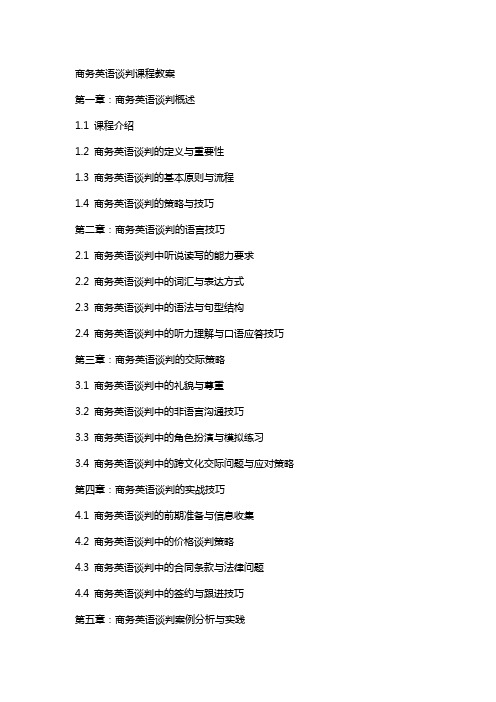
商务英语谈判课程教案第一章:商务英语谈判概述1.1 课程介绍1.2 商务英语谈判的定义与重要性1.3 商务英语谈判的基本原则与流程1.4 商务英语谈判的策略与技巧第二章:商务英语谈判的语言技巧2.1 商务英语谈判中听说读写的能力要求2.2 商务英语谈判中的词汇与表达方式2.3 商务英语谈判中的语法与句型结构2.4 商务英语谈判中的听力理解与口语应答技巧第三章:商务英语谈判的交际策略3.1 商务英语谈判中的礼貌与尊重3.2 商务英语谈判中的非语言沟通技巧3.3 商务英语谈判中的角色扮演与模拟练习3.4 商务英语谈判中的跨文化交际问题与应对策略第四章:商务英语谈判的实战技巧4.1 商务英语谈判的前期准备与信息收集4.2 商务英语谈判中的价格谈判策略4.3 商务英语谈判中的合同条款与法律问题4.4 商务英语谈判中的签约与跟进技巧第五章:商务英语谈判案例分析与实践5.1 商务英语谈判成功案例分析5.2 商务英语谈判失败案例分析5.3 模拟商务英语谈判实践5.4 商务英语谈判实践中的问题与解决方案第六章:商务英语谈判中的沟通与协调6.1 商务英语谈判中的有效沟通技巧6.2 商务英语谈判中的协调与调解方法6.3 商务英语谈判中的冲突管理与解决策略6.4 商务英语谈判中的沟通案例分析与实践第七章:商务英语谈判中的说服与影响7.1 商务英语谈判中的说服技巧与策略7.2 商务英语谈判中的影响力构建与运用7.3 商务英语谈判中的心理战术与应对方法7.4 商务英语谈判中的说服案例分析与实践第八章:商务英语谈判中的合作与联盟8.1 商务英语谈判中的合作机会识别与评估8.2 商务英语谈判中的联盟建立与维护策略8.3 商务英语谈判中的合作伙伴选择与谈判要点8.4 商务英语谈判中的合作案例分析与实践第九章:商务英语谈判中的风险管理9.1 商务英语谈判中的风险识别与评估9.2 商务英语谈判中的风险防范与应对策略9.3 商务英语谈判中的合同管理与违约处理9.4 商务英语谈判中的风险案例分析与实践第十章:商务英语谈判的综合能力提升10.1 商务英语谈判中的自我管理与自我提升10.2 商务英语谈判中的团队管理与协作能力提升10.3 商务英语谈判中的谈判策略创新与思维拓展10.4 商务英语谈判中的综合能力提升案例分析与实践重点和难点解析一、商务英语谈判概述重点:商务英语谈判的定义与重要性、基本原则与流程难点:商务英语谈判的策略与技巧的理解与应用二、商务英语谈判的语言技巧重点:听说读写的能力要求、词汇与表达方式难点:语法与句型结构在实际谈判中的应用三、商务英语谈判的交际策略重点:礼貌与尊重、非语言沟通技巧难点:跨文化交际问题与应对策略的灵活运用四、商务英语谈判的实战技巧重点:前期准备与信息收集、价格谈判策略难点:合同条款与法律问题的理解与运用五、商务英语谈判案例分析与实践重点:成功与失败案例的分析难点:模拟商务英语谈判实践的指导与问题解决六、商务英语谈判中的沟通与协调重点:有效沟通技巧、协调与调解方法难点:冲突管理与解决策略的实际操作七、商务英语谈判中的说服与影响重点:说服技巧与策略、影响力构建与运用难点:心理战术与应对方法的运用八、商务英语谈判中的合作与联盟重点:合作机会识别与评估、联盟建立与维护策略难点:合作伙伴选择与谈判要点的决策九、商务英语谈判中的风险管理重点:风险识别与评估、风险防范与应对策略难点:合同管理与违约处理的实施十、商务英语谈判的综合能力提升重点:自我管理与自我提升、团队管理与协作能力提升难点:谈判策略创新与思维拓展的应用全文总结和概括:本教案针对商务英语谈判的各个方面进行了深入的讲解和练习,从谈判概述到实战技巧,再到案例分析与实践,涵盖了谈判过程中的各个环节。
- 1、下载文档前请自行甄别文档内容的完整性,平台不提供额外的编辑、内容补充、找答案等附加服务。
- 2、"仅部分预览"的文档,不可在线预览部分如存在完整性等问题,可反馈申请退款(可完整预览的文档不适用该条件!)。
- 3、如文档侵犯您的权益,请联系客服反馈,我们会尽快为您处理(人工客服工作时间:9:00-18:30)。
商务英语谈判( Business Spoken English)Preface:(Important points and key words and expressions)Foreign trade work—business negotiation and business reception (or receiving foreign businessmen)。
Business negotiation:talks on price and payment terms, quality of goods, packing of goods,delivery and shipment,insurance,complaints and claims, after-sales service, agency and distribution, doing business in flexible ways, etc。
Business reception (or receiving foreign businessmen): meeting foreign businessmen at the airport,inviting foreign businessmen to dinner parties, accompanying foreign businessmen on their visiting factories, sightseeing, shopping, etc。
What skills should a qualified foreign trade worker possess?What is a suitable textbook of business spoken English? (with many real situations / in short sentences / clear, reasonable, convincing)Spoken English for International Business: Dafa Garments Co。
/ Wilshire Fashion,Inc. Supplementary reading materials and oral practice of business contactsThe main points of this textbook Spoken English for International Business:American merchants: purchase manager of this firm, Mr. Richard Bowen, his secretary Miss Diana Cade, and assistant manager, Mr。
Guy DeweyThe Chinese merchants: Li Kang, marketing manager of Dafa Garments Co., and his assistant,Yang ZhonghuaPurchasing better garments—making machines in the USAttending a cocktail party at the Chinese Consulate in Los Angles。
Introducing to some American businessmen,Mr. Taylor, a brewer (酿酒商) and Mr。
Bush, a sportswear,maker(运动服制作商)the way to do business of exclusive sales and agency, and the way to invest in China。
Part OneMeeting Foreign Businessmen (or a Foreign Businessman) at the AirportI。
Background: (Important points and key words and expressions)(1) To receive foreign businessmen at the airport(2) To take them by car to the hotel where they will stay(3) To leave the hotel after a short stay so that your guests can have a rest2. Language points:(Words) foreign trade and economic co-operation对外贸易经济合作 / talk on (or about) business with sb。
与某人谈生意 / car / van / limo (=limousine)豪华轿车;(美国机场接送乘客的)中型客车 / taxi / a single (double) room with bath / a single (double) room without bath (Sentences)* Appropriate expressions to greet the guests when you meet them: (See p4-p5 of the textbook) (1.1)* Making introductions:(p5)(2。
1a)* How to invite the guests (guest) to a dinner party:-We’d like you to come to a dinner this evening。
(We shall be so pleased if you could come to the dinner party.)—With pleasure. What time will the dinner be?—At 6:30。
I'll be back for you at 6:10.(Oral practice):1。
Go over the words and sentences (Language points) by reading them aloud.2. Work in groups of three with the patterns in Ex 1。
1 (p4-p5) and Ex 2.1 a(p5)。
Following is the situation: Li Ming and Wei Qingqing come to the airport to meet a foreign merchant, Mr。
Singer。
Since it’s the first time for them to meet, Wei Qingqing holds a sign with Mr. Singer’s name on it. Soon Mr. Singer appears at the exit of the airport and comes towards them。
Then Li Ming and Mr. Singer begin to talk with each other。
After that, Li Ming introduces Wei Qingqing to Mr. Singer. Then they two greet each other。
II. Study the text of Episode One.(Listen to the tape。
)(Read the text aloud after class。
)Questions on the text:1。
How many characters are there in the text? Who are they?2。
Who landed at the airport first? Did the hosts and the guest meet before? Then how did the host find him?3. What hotel will the foreigners stay ? Where is it situated?Oral practice:(Situation): Mr。
Smith and Mr。
Brown are merchants from Great Britain。
They are old customers of Yong Sheng Company. Qiu Weiling and Chen Feng, representatives of Yong Sheng Company are waiting for their British guests at the airport. Qiu knows Mr. Smith very well but does not know Mr. Brown. And Chen Feng has never met Smith and Brown. When the Chinese meet their guests at the exit, they exchange greetings with each other and make introductions. Qiu and Chen help the guests with their luggage and take them to the car they arrange for the guests。
In the car, Qiu asks Smith whether they had a good journey。
Smith says it is a smooth flight and he enjoys it very much。
Qiu also asks Smith how many days they will stay in Wuhan. Smith says that he will stay for four days and that they will go to Shanghai after their four days’ stay in Wuhan. Qiu suggests the guests go sightseeing to the East Lake, the Yellow Crane Tower and the Guiyuan Temple。
